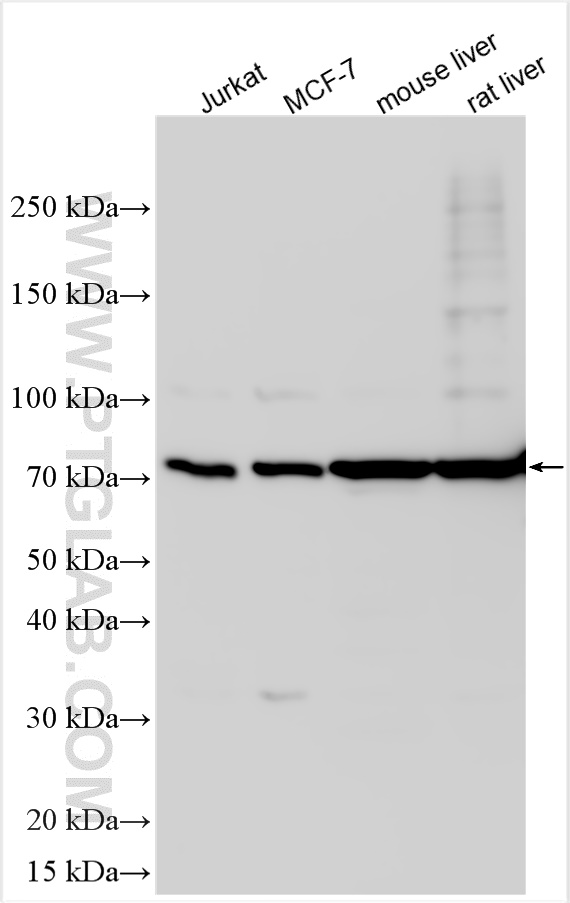验证数据展示
经过测试的应用
| Positive WB detected in | Jurkat cells, MCF-7 cells, mouse liver tissue, rat liver tissue |
推荐稀释比
| 应用 | 推荐稀释比 |
|---|---|
| Western Blot (WB) | WB : 1:500-1:1000 |
| It is recommended that this reagent should be titrated in each testing system to obtain optimal results. | |
| Sample-dependent, Check data in validation data gallery. | |
产品信息
26934-1-AP targets ANGPTL1 in WB, ELISA applications and shows reactivity with human, mouse, rat samples.
| 经测试应用 | WB, ELISA Application Description |
| 经测试反应性 | human, mouse, rat |
| 免疫原 |
CatNo: Ag25529 Product name: Recombinant human ANGPTL1 protein Source: e coli.-derived, PGEX-4T Tag: GST Domain: 158-315 aa of BC050640 Sequence: ILNVTTEMLKMATRYRELEVKYASLTDLVNNQSVMITLLEEQCLRIFSRQDTHVSPPLVQVVPQHIPNSQQYTPGLLGGNEIQRDPGYPRDLMPPPDLATSPTKSPFKIPPVTFINEGPFKDCQQAKEAGHSVSGIYMIKPENSNGPMQLWCENSLDP 种属同源性预测 |
| 宿主/亚型 | Rabbit / IgG |
| 抗体类别 | Polyclonal |
| 产品类型 | Antibody |
| 全称 | angiopoietin-like 1 |
| 别名 | ANG 3, ANG3, ANG-3, Angiopoietin 3, angiopoietin like 1 |
| 计算分子量 | 55 kDa |
| 观测分子量 | 64-70 kDa |
| GenBank蛋白编号 | BC050640 |
| 基因名称 | ANGPTL1 |
| Gene ID (NCBI) | 9068 |
| 偶联类型 | Unconjugated |
| 形式 | Liquid |
| 纯化方式 | Antigen affinity purification |
| UNIPROT ID | O95841 |
| 储存缓冲液 | PBS with 0.02% sodium azide and 50% glycerol, pH 7.3. |
| 储存条件 | Store at -20°C. Stable for one year after shipment. Aliquoting is unnecessary for -20oC storage. |
背景介绍
Angiopoietin-related protein 1 (ANGPTL1) also known as angiopoietin-3 (ANG-3), is a secreted glycoprotein that structurally resembles angiogenin and is involved in the regulation of angiogenesis. ANGPTL1 is down-regulated in various cancers, including colorectal cancer (CRC), and its expression is inversely correlated with metastasis and poor clinical outcomes. ANGPTL1 has been shown to suppress angiogenesis, cancer invasion, metastasis, and cancer progression. The predicted molecular weight of ANGPTL1 is 57 kDa, but the literature reports that the detected molecular weight of ANGPTL1 is around 68 kDa (PMID: 15284220 ).
实验方案
| Product Specific Protocols | |
|---|---|
| WB protocol for ANGPTL1 antibody 26934-1-AP | Download protocol |
| Standard Protocols | |
|---|---|
| Click here to view our Standard Protocols |
